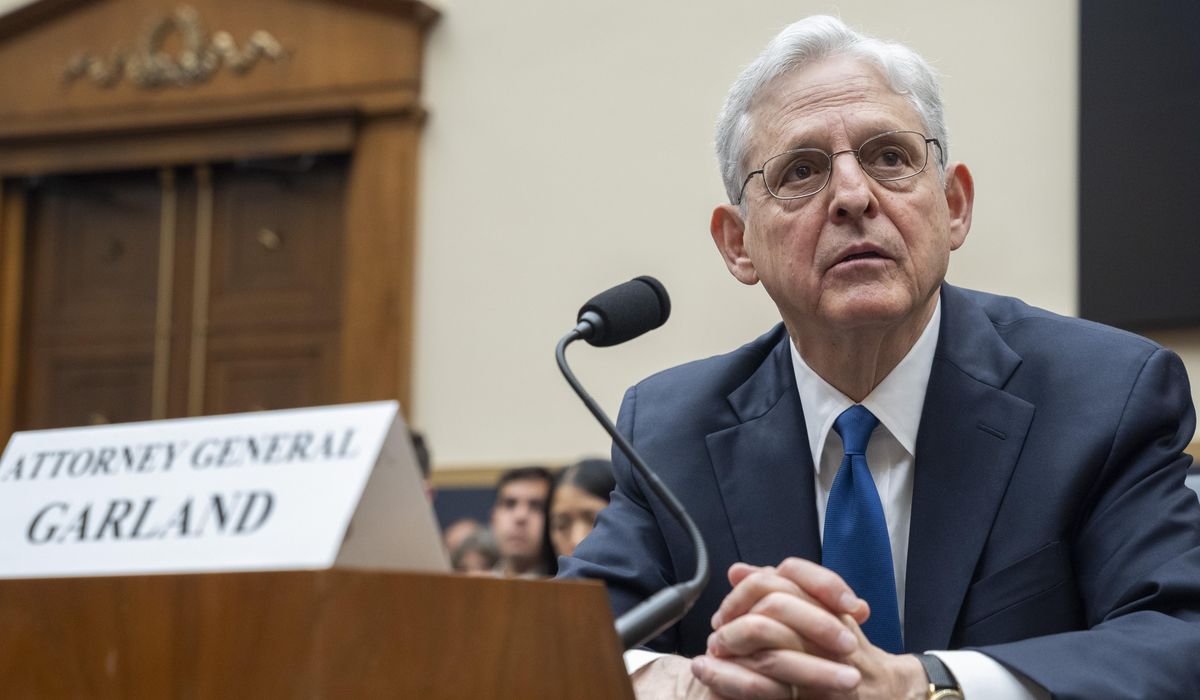


Attorney General Merrick Garland doubled down Tuesday on his refusal to release the tapes of President Biden’s interview with a special counsel who called him an “elderly man with a poor memory,” saying it would taint other investigations if the tapes became public.
Mr. Garland admitted to lawmakers that he hasn’t listened to the recordings, saying he trusted the transcript of the criminal prosecutor’s interview with Mr. Biden. He said that the transcript, which has been released, will have to be good enough for Congress and the public.
He said that’s the right balance for the Justice Department if it wants cooperation from targets and witnesses, who might not come forward if they fear their audio would be made public.
“The Constitution requires me to protect the separation of powers and our ability to do investigations in the future,” Mr. Garland told the House Judiciary Committee.
He said Congress doesn’t have a “legislative purpose” in demanding the tapes themselves.
The tapes and transcripts are from Special Counsel Robert K. Hur, who investigated whether Mr. Biden committed crimes by taking classified documents from his previous stints in office — including as vice president — and storing them lying in unsecured places.
Mr. Hur concluded, based on his lengthy interviews with Mr. Biden, that the president would be tough to prosecute because of how he would come across to a jury. Mr. Hur labeled him a “sympathetic, well-meaning, elderly man with a poor memory.”
The House has subpoenaed the tapes and Mr. Garland has refused to comply.
That sparked contempt-of-Congress proceedings, with the Judiciary Committee having voted last month to hold him in contempt.
Republicans pointed to several court precedents that seemed to weigh on the side of requiring the release of the tape, including one involving President Nixon.
Mr. Garland said it wasn’t a good comparison.
He said the Nixon case involved the president talking with staff, and Nixon admitted he had altered the transcripts, which made the release of the tapes important.
In Mr. Biden’s case, Mr. Garland said, the tapes are of an interview during a criminal investigation. He also said the Justice Department has concluded the transcript is a good match with the tapes, omitting only pauses and repeated words.
Rep. Andy Biggs, Arizona Republican, said there could be a lot hidden inside those omissions.
“The audio would tell us so much more,” he said.
Mr. Garland was before the Judiciary Committee on Tuesday where his decisions surrounding Mr. Biden and former President Donald Trump came under intense scrutiny.
He defended his decision to appoint Jack Smith as the special counsel pursuing Mr. Trump, saying he wanted to find a longtime prosecutor who was insulated from politics.
“He was independent, he was nonpartisan, he had never held a political office, he was never appointed in a political office,” the attorney general said.
Mr. Garland also combated other claims.
- He said the search warrant issued for Mr. Trump’s documents, which authorized agents to use deadly force if necessary, was not an assassination attempt. He said that language in the warrant was the “standard use of force policy.” In a social media post, Mr. Trump said agents were “locked & loaded ready to take me out.”
- He rebuffed demands that he release any communications between the Justice Department and the prosecutions of Mr. Trump in New York and Georgia. He told lawmakers to submit requests and they would be referred to a process.
Rep. Matt Gaetz, Florida Republican, said Mr. Garland’s refusal is part of the problem.
“You’re actually advancing the very dangerous conspiracy theory you’re worried about,” he said.
• Stephen Dinan can be reached at sdinan@washingtontimes.com.
